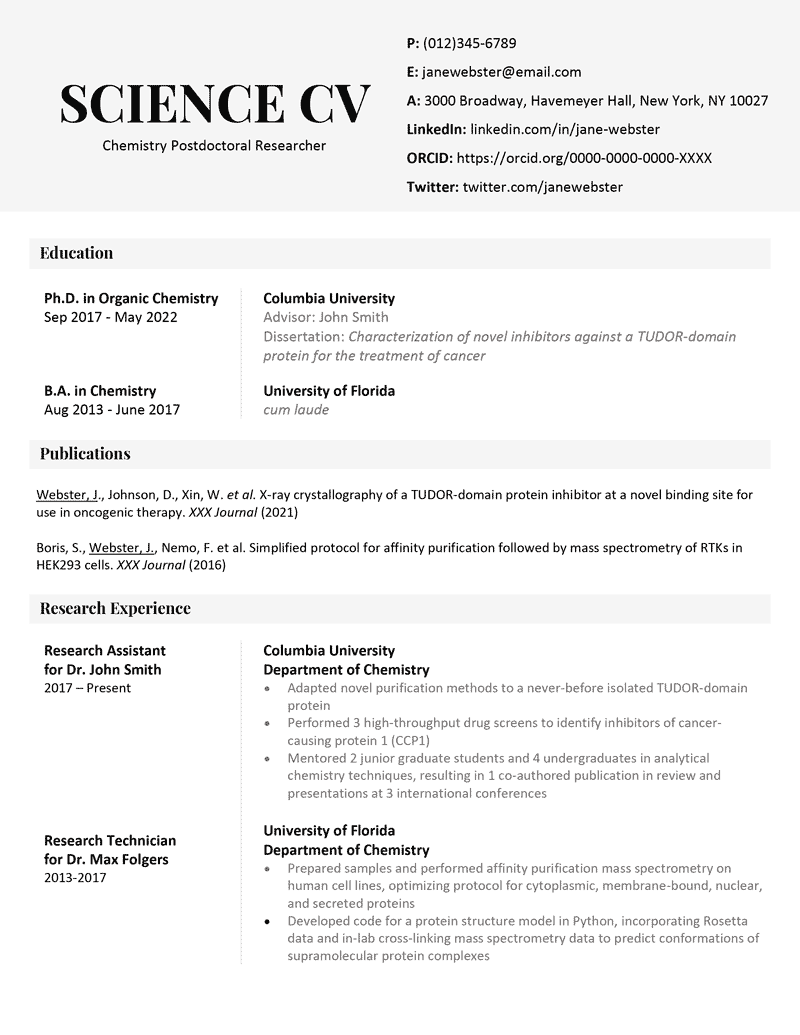Stepping out of university with a science degree in hand is an exciting milestone. You’ve spent years mastering complex theories, conducting intricate experiments, and honing your analytical skills. But now comes the critical next step: translating all that incredible academic and practical experience into a compelling document that grabs the attention of potential employers. It’s not just about listing your qualifications; it’s about showcasing your unique scientific mindset and contributions.
Creating a curriculum vitae that truly stands out in a competitive job market can feel like another challenging experiment. How do you highlight your lab skills, research projects, and data analysis capabilities effectively? What’s the best way to structure your achievements to resonate with recruiters looking for specific scientific talent? This guide will help you navigate these questions, offering insights into building an impactful CV that reflects your true potential as a science graduate.
Building Blocks of a Stellar Science CV
When you’re a science graduate, your CV isn’t just a list of jobs and dates; it’s a testament to your scientific journey. Unlike more general CVs, yours needs to emphasize your unique research experience, laboratory techniques, and problem-solving abilities. Every section should be tailored to showcase why your scientific background makes you an ideal candidate for roles ranging from research and development to data analysis or clinical science.
Start with a strong personal statement or professional summary at the top. This isn’t just a generic introduction; it’s your elevator pitch, specifically crafted for a scientific context. Briefly highlight your area of expertise, key technical skills, and career aspirations. For instance, you might mention your proficiency in molecular biology techniques or your passion for environmental research, immediately signaling your value to a scientific employer.
The education section is paramount for a science graduate. Beyond simply listing your degree and university, delve deeper. Mention relevant modules, especially those with a strong practical component. If you achieved distinctions in specific subjects or undertook significant final-year projects, elaborate on them. This section should paint a clear picture of the depth and breadth of your scientific learning.

Showcasing Your Research and Lab Experience
This is often the most critical section for a science graduate. Here, you’ll detail your practical involvement in research projects, laboratory work, or fieldwork. Don’t just list the project title; describe your role, the methodologies you employed, the equipment you used, and the outcomes or conclusions drawn. Quantify your achievements wherever possible – “analyzed data from 50 samples” is far more impactful than “analyzed data.” Use strong action verbs to describe your contributions.
- Designed and executed experiments using [specific techniques/equipment].
- Analyzed complex datasets using [software/statistical methods] to identify trends.
- Collaborated with a team of [number] researchers on [project type].
- Presented findings at [conference/seminar] or contributed to [publication].
Following your research experience, a dedicated ‘Skills’ section is essential. This should be bifurcated into technical skills (e.g., PCR, chromatography, microscopy, bioinformatics software like R or Python, specific lab equipment operation) and transferable skills (e.g., critical thinking, data interpretation, problem-solving, teamwork, scientific writing). Be specific; avoid vague terms. This section allows quick scanning by recruiters and ATS systems for required competencies, proving your CV template for science graduate is highly effective.
Beyond the Basics: Polishing Your Science CV for Success
Once you’ve structured the core of your CV, the next step is to refine it to ensure maximum impact. Remember that many companies use Applicant Tracking Systems (ATS) to filter CVs based on keywords. Therefore, it’s crucial to tailor your CV for each application by incorporating keywords from the job description. This means understanding the specific scientific terms, techniques, and software mentioned in the job advert and subtly integrating them into your skills, experience, and even your personal statement.
Quantifying your achievements goes a long way in a scientific CV. Instead of simply saying “conducted experiments,” try “successfully conducted 20 experiments, leading to a 15% improvement in [outcome].” If you managed a budget, led a small team, or completed a project ahead of schedule, include those metrics. Numbers make your contributions tangible and demonstrate your efficiency and effectiveness in a scientific setting.
Clarity and conciseness are paramount. Scientific communication demands precision, and your CV is no exception. Avoid jargon where simpler terms suffice, or if technical terms are necessary, ensure they are industry-standard. Proofread meticulously for typos and grammatical errors – a flawless CV demonstrates attention to detail, a highly valued trait in scientific roles. A well-formatted, clean layout also contributes to readability and a professional impression.
- Use action verbs to start bullet points (e.g., Developed, Analyzed, Investigated, Managed).
- Keep sentences concise and to the point.
- Ensure consistent formatting for dates, headings, and bullet points.
- Get a second pair of eyes to review for errors and clarity.
Finally, consider including any relevant professional development, such as certifications in specific lab techniques, participation in scientific workshops, or attendance at conferences. If you have any publications, presentations, or patents, list them prominently. Even volunteer work that showcases your organizational skills or scientific outreach can be a valuable addition, demonstrating your commitment and passion beyond academic requirements.
Crafting an impactful CV is an essential step in launching your scientific career. It’s not merely a document of your past, but a forward-looking statement of your potential and what you can bring to a new role. By focusing on your unique scientific skills, quantifiable achievements, and tailoring your application, you significantly increase your chances of securing that coveted interview.
Think of your CV as your scientific abstract – a concise, compelling summary of your most important work and findings, designed to pique the reader’s interest and encourage them to delve deeper. With careful attention to detail and a strategic approach, you’ll be well on your way to securing your next scientific opportunity.
